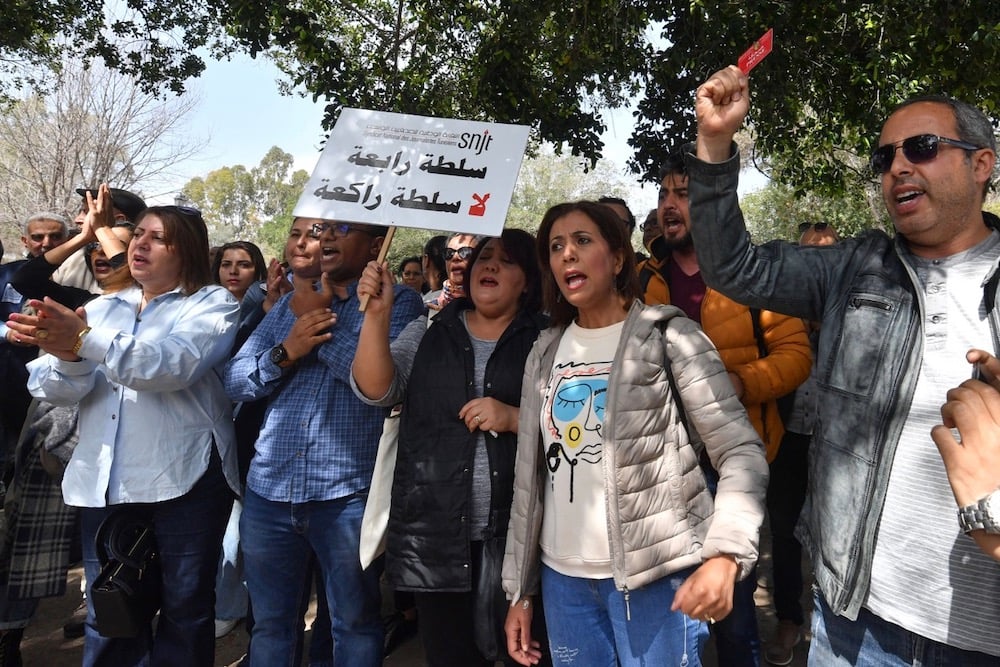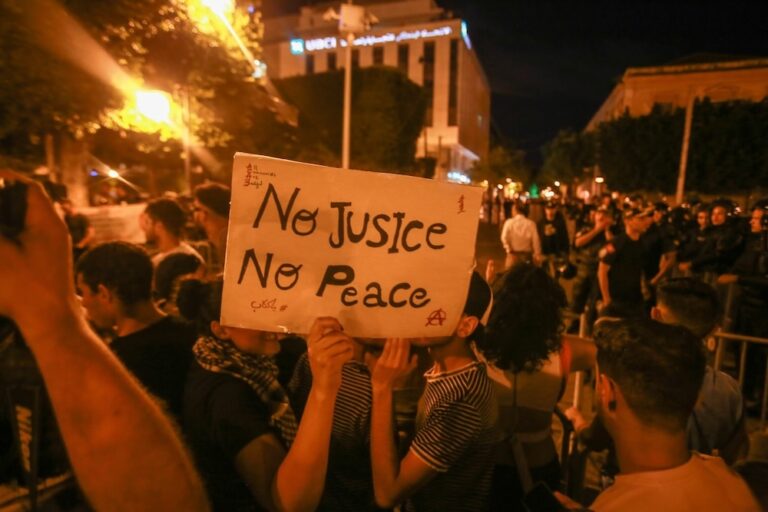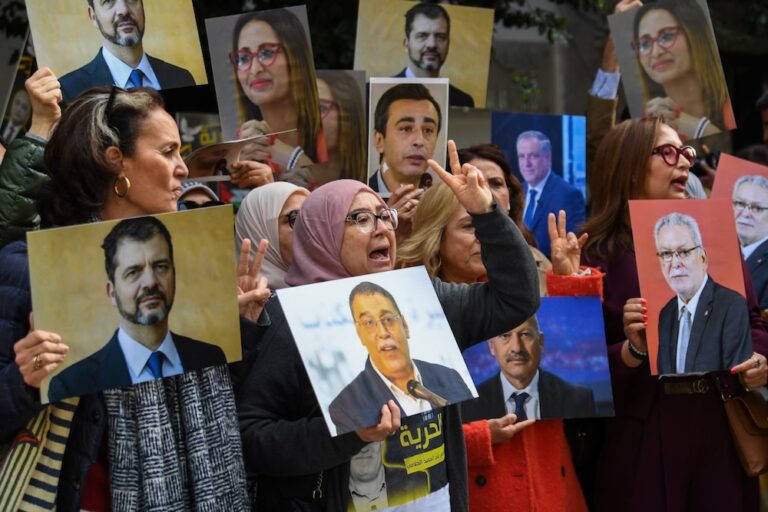Critical measures taken in the past two years continue to threaten a fragile civic space.
This statement was originally published on article19.org on 24 July 2023.
On 25 July 25, 2021, Tunisia marked a pivotal moment in its history, as President Kais Saied declared a state of emergency, accompanied by the announcement of severe measures to shrink civic space. The human rights situation in the country has not been this fragile and in such crisis since before the 2011 revolution.
With the concentration of power in the hands of the president, two years on, the institutional mechanisms ensuring the protection of human rights have been almost entirely dismantled. Judicial independence has been undermined, and oppressive laws have been put in place, infringing on fundamental rights including freedom of speech and the press, the freedom to protest and assemble, and even the right to access information. In 2023, the escalating number of arrests of journalists and opposition politicians, coupled with an initiative to revise the legal frameworks relating to the functioning of associated freedoms, are alarming indicators of the authorities’ resolve to intensify their repression of the country’s civic space and to restrict freedom of expression.
The measures taken by the President of the Republic, Kais Saied, since 25 July 2021 have concentrated his power over the executive and legislative branches, as well as parts of the judiciary, with no checks and balances. These measures place Tunisia in a grave situation, effectively suspending the democratic system with no guarantees for its reinstatement.
Human rights are also at risk, as attacks on freedom of expression, press freedom, and the right to information continue. ARTICLE 19 is concerned by the number of attacks reported against journalists, the lack of investigation into these attacks, and the arrest and prosecution of activists and politicians. Media outlets and broadcasters have been subject to new directives impeding their ability to report freely on the situation.
In this briefing, ARTICLE 19 sets out our concerns with crucial measures taken in Tunisia over the last two years, and their serious impact on human rights and democracy. We call on President Saied to ensure a return of Tunisia’s democratic institutions, urgently restore human rights protections in line with international standards, and end the prosecution of those exercising their right to freedom of expression.
1. Freedom-destroying Decree-Laws
Dismantling of judicial independence: Changes in legislation have significantly weakened judicial independence, undermining the separation of power and limiting the ability of courts to protect human rights. On 1 June 2022, under Decree-Law 2022-35, which gives the President the authority to summarily dismiss judges and prosecutors, Kais Saied dismissed 57 judges. The President also issued Decree-Law 2022-11, which dissolved the Superior Council of the Judiciary, replacing it with a Provisional Superior Council and conferring considerable powers on the Executive to influence appointments, removals and the general functioning of the Provisional Superior Council. Saied later amended Decree-Law 2022-11 so as to remove the power of dismissal from the Provisional Superior Council and to allow the President to exercise this power upon receiving a report from the competent authorities. To avoid potential judicial decisions overturning or delaying the execution of dismissal, the Decree-Law also provides that a dismissal will trigger a criminal prosecution and can only be challenged once a final judgment has been issued.
Criminalising online expression: The Decree-Law no. 2022-54, enacted on 13 September, 2022, ostensibly addresses offences related to information and communication systems. However, it criminalises vaguely-defined types of online expression, such as ‘dissemination of false information’, rather than targeting actual cyber-dependant crimes. On the basis of Decree-Law no. 2022-54, multiple investigations have been opened against critics of the government. The Decree-Law infringes upon the Tunisian Constitution and international human rights norms, lacks due process protections, and does not adhere to the principles of necessity and proportionality. Moreover, it imposes penalties for many offences already addressed by other legal texts. This is incompatible with legal certainty requirements and increases the possibility of arbitrary application of these provisions. The sanctioning regime, and in particular prison sentences, are excessive and disproportionate. Lastly, the Decree-Law confers broad investigative powers to Tunisian authorities without providing adequate procedural safeguards or rights protections, such as empowering law enforcement agencies to access and collect data from any information system, device, or telecommunications traffic data or intercepting communications with prior judicial approval.
In March 2023, Tunisia failed to heed essential recommendations put forth by several states, including Switzerland, UK and Germany, and the Universal Periodic Review (UPR) working group during its fourth UPR cycle in November 2022. The Tunisian government notably dismissed all proposals requesting the revocation of Decree-Law 2022-54 and calling for a halt to the practice of trying civilians, including journalists, lawyers, and political opponents, in military courts.
2. Shrinking Civic Space
Authorities have used repressive measures and violence against demonstrators for defying the prohibition on assemblies. These measures include automatic dispersal of assemblies, use of disproportionate force, intimidation and arrests. There have also been repressive measures taken against those circulating publications calling for demonstrations or supporting protest movements. Allegations of security forces using excessive force against demonstrators have not been promptly and thoroughly investigated. On 14 January, 2022, demonstrators peacefully expressed their rejection of the decisions made by the President of the Republic on 25 July, 2021, along with their ensuing consequences. Upon their arrival on the roads leading to the capital’s centre, the protesters faced a brutal crackdown from the security forces. They were met with beatings, insults, and the use of motorcycles and water cannons as part of tactics to scatter them and prevent their access to Habib Bourguiba Avenue, a landmark associated with the revolution of 2011. Many participants were detained and transported to police stations. The infringement also affected multiple journalists covering the protests. This included Zina Mejri, who was arrested and later released; Amira Jebali, whose phone was confiscated, with authorities accessing its data; and Mathiew Galtier, a correspondent for the French newspaper Liberation, who was physically attacked and had his equipment seized.
3. Weakening of the right of Access to information
Access to information is a critical mechanism that enables the public and civil society to access information held by public bodies, and empowers them to hold their leaders accountable. As stated in the first article of Law No. 22 of 2016 on the right to access to information, the aim of this law is to bolster transparency and accountability principles, and to promote public involvement in shaping, implementing, and evaluating public policies. Violations of this right inevitably result in hindering individuals from exercising their oversight over public authorities and from active participation in public matters.
The new 2022 constitution, under Article 38, asserts, ‘The state safeguards the right to information and the right to access information, and it endeavours to ensure the right to access communication networks.’ Despite this, ARTICLE 19 has frequently observed that governmental bodies are deficient in their appreciation of the right to information. Moreover, not every ministry employs spokespersons tasked with delivering transparent information. Access to information continues to be a hurdle for common citizens, which is a concern echoed by researchers and journalists, who have voiced their disappointment over the diminishing collaboration from Tunisian administrative bodies.
ARTICLE 19 reminds President Saied of the right citizens have to access information, as enshrined in the Tunisian Constitution. We call for the adoption of a communication policy based on openness and transparency, and that makes information widely available citizens, including information and content that is critical of the government or is of a political nature that does not necessarily follow the ruling party lines. Such policy should have the aim of subjecting state institutions to the principles of transparency and accountability in accordance with constitutional provisions.
4. Attacks against media and journalists
Weakening of the Tunisian media landscape: The tenure of President Kais Saied has witnessed significant shifts in the Tunisian media landscape, resulting in its degradation. Over the last two years, this has been characterised by concerning limitations on press liberties, heightened digital censorship, pervasive political meddling, harassment and threats towards journalists, restricted access to information, manipulation of media oversight entities, and the stifling of independent media outlets.
Prominent media platforms such as Shams Fm and Dar Assabah were forcibly shut down by judicial order. Towards the end of 2022, internet censorship saw a sharp rise, mainly due to the implementation of Decree-Law 2022-54. Additionally, the media landscape has been marred by an uptick in political interference, such as direct dismissal of the CEO of the state’s national TV and the President’s office’s appointments to senior positions at the state-owned news agency, Tunisian News Agency, TAP, thereby undermining the integrity of its editorial stance.
Additionally, the President’s office has manipulated media regulatory bodies by replacing members of the Independent High Authority for Audiovisual Communication (HAICA) with government appointees, leading to concerns about the body’s independence.
ARTICLE 19 expresses deep concern over the future of HAICA, which plays a crucial role in fostering media pluralism, independence, and freedom of expression in Tunisia. Regulatory authorities hold crucial roles in both the media environment and democratic societies. They uphold media liberty and plurality, facilitating an array of perspectives to thrive. These bodies create and implement standards for fair, objective reporting, all while mitigating the spread of hate speech and disinformation. In essence, a strong, independent HAICA is key to preserving democratic processes and strengthening the media landscape in Tunisia.
Authorities targeted Mosaique FM, one of the most important and popular radio stations in Tunisia, by arresting journalist Noureddine Boutar, Radio Mosaique’s director, following broadcasts that criticised public and political affairs. Alternative media outlets such as Nawaat were hit in March 2023 by severe cyber attacks, posing a threat to their continued operations. Taken together, these developments paint a bleak picture of the media environment in Tunisia, characterised by a significant erosion of press freedoms and a growing climate of fear and censorship.
Imprisonment of journalists: The journalistic landscape in Tunisia is characterised by a notable decline in freedom of expression, as evidenced by an increase in convictions, arrests, and legal actions taken against journalists. Prominent cases include those of Monia Arfaoui, a journalist for Al-Sabah newspaper, who was questioned by an investigating judge on 24 and 31 March, 2023. This was in response to two complaints the Ministry filed against her after she criticised the suspension of a planned partnership between the Ministry of Religious Affairs and the Office of the High Commissioner for Human Rights.
Another instance involves Mohamed Boughlab, a journalist for Cap FM radio station, who appeared in court on 7 April, 2023 in response to his reporting on a luxury car, previously confiscated by the customs department, being assigned to the Minister of Religious Affairs – a topic undeniably of public interest.
In May 2023, a complaint was filed against two journalists, Haythem El Mekki and Elyes Gharbi, in response to comments they made on the Midi Show, broadcast on Mosaique FM on 15 May. The complaint relates to charges of defamation under Article 245 of the Criminal Code and to accusations that they spread rumours affecting internal security, an offence under Article 24 of Decree Law No. 2022-54. On 16 May, 2023, journalist Khelifa Guesmi was subjected to an unprecedented sentence in Tunisia and given a five-year prison term under the provisions of the anti-terrorism law.
Zied Al-Heni was also arrested, then released on 20 June 2023 following a comment he made on IFM Radio about the crime of ‘committing a brutal act against the President of the Republic’.
Within two years, Tunisia’s ranking dropped significantly in ARTICLE 19’s Global Expression Report 2023, which annually documents and ranks the levels of freedom of expression in countries around the world. According to the report, Tunisia is now ranked 79 out of 161. Reporters Without Borders’ World Press Freedom Index 2023 ranks Tunisia as 121 out of 181 countries and considers it as one of 38 countries where freedom of expression is deemed unsafe.
Recommendations
In order to guarantee freedom of expression and access to information in Tunisia , ARTICLE 19 makes the following recommendations to the President of the Republic, the judiciary, security forces and civil society.
Recommendations for the President of the Republic
- Prioritise the reinforcement of fundamental freedoms, including freedom of expression and the right to access information, and ensure that all laws conform with international human rights standards.
- Abolish or revise laws that suppress freedom of expression, such as those that permit censorship or excessively penalise defamation, such as Decree 54.
- Ensure a healthy environment for the independence of regulatory and self-regulatory institutions.
- Advocate for respect for journalistic freedom and release all journalists from detention.
- Invite ministries to establish spokespersons to facilitate access to information for all citizens.
Recommendations for security forces
- Ensure force is not used against peaceful protesters, guaranteeing that any response to protests is proportionate and necessary.
- Ensure adequate training on handling protests non-violently and respecting protesters’ rights. Security forces should be held accountable for any excessive use of force or misconduct.
- Ensure the safety and freedom of journalists and medical personnel, acknowledging their critical role in documenting events and providing aid.
Recommendations for judicial authorities
- Ensure that any restrictions on freedom of expression adhere to the principles of legality, legitimacy, necessity, and proportionality.
- Protect journalists and other individuals exercising their right to freedom of expression from undue legal action, such as frivolous lawsuits meant to suppress their activities.
Recommendations for civil society
- Continue to advocate for freedom of expression and the right to access information, raising awareness on these topics among the general public.
- Develop programmes to promote media literacy, enabling the public to discern quality information and understand their rights.
- Protect the civic space against any intimidation and remain united in peaceful solidarity.



